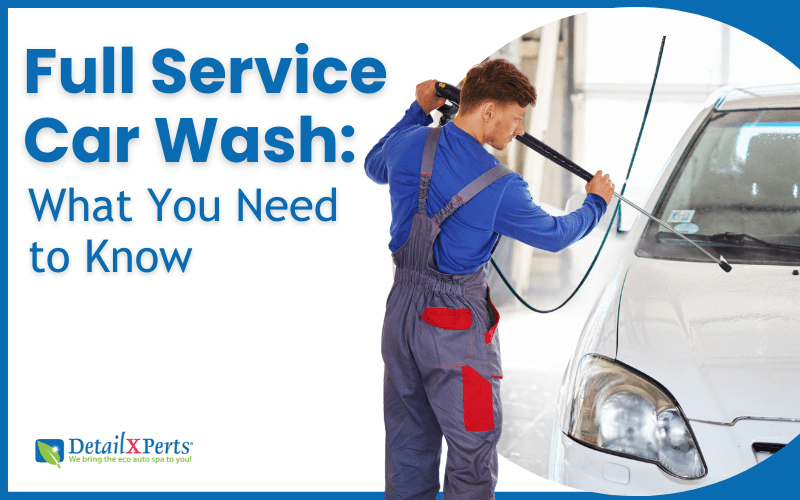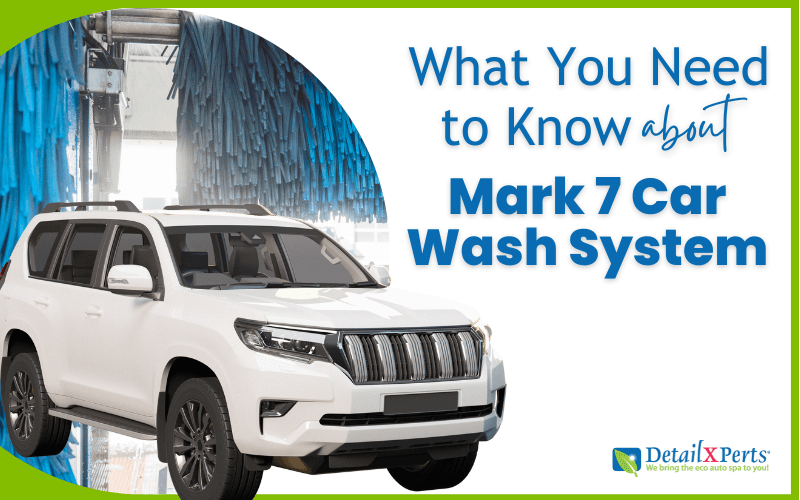A full service car wash is the obvious choice if you love a super-clean vehicle inside and out. How much it costs and what you get for your money depends on where you go and what you request. For example, most places offer packages with optional add-ons for a more customized experience. Here’s what you need to know before you visit this type of car wash facility.
What is a Full Service Car Wash?
A full service car wash combines exterior and interior auto detailing. It’s the go-to service when your vehicle needs thorough cleaning or if you want it to shine like new for a special occasion. First, check the type of exterior wash. For example, a full-serve hand car wash suits most vehicles such as cars, vans, SUVs and RVs. Some places even let you bring your boat. Alternatively, some automatic car washes offer full-service packages, but the bay or tunnel size may not be suitable for larger vehicles.
What Does a Full Service Car Wash Include?
It depends on where you go and what you ask for. You can get high-end car wash services offering top-level auto detailing or an express full service that is quicker and cheaper without the optional add-ons. Here is a general idea of what to expect:
- Exterior cleaning to remove dirt and grime. Automated services include a soft cloth car wash or laser car wash. If you prefer more attention to detail, visit a car wash where auto detailers know how to hand wash a car exterior with care and attention.
- Cleaning and shining the wheels and tires.
- Engine cleaning.
- Headlight restoration.
- Interior detailing – vacuuming and cleaning other surfaces such as the dashboard, door panels, and center console. Stain removal may cost extra.
- Cleaning the interior and exterior windows and mirrors.
- Mold and odor removal.
- Air vent sanitization.
- Most full service car washes offer additional services such as waxing, polishing, protective coatings, and leather conditioning.
How Long Does a Full Service Car Wash Take?
Again, it depends on several factors, such as how long you spend at the car wash and how many add-ons you pay for. Some places take 60 minutes, while others take 5-6 hours for high-end detailing. Here are some factors to bear in mind:
- Larger vehicles like vans or RVs will take longer to clean than smaller cars.
- If your car is very dirty, it will take someone longer to clean it.
- Extra services such as sanitizing the interior or specialty wax treatments will require additional time.
- Experienced staff will work more quickly while achieving superior results.
- If the car wash is busy and other vehicles are ahead of you, the full-service experience can take longer than you would like. If you don’t mind doing some of the work yourself, consider other options like a self service car wash.
How Much Does a Full Service Car Wash Cost?
Always check the pricing menu, including add-on costs, when you arrive at the car wash. Additionally, some car washes may offer discounted pricing or loyalty programs for regular customers, so it’s always worth asking. Here are some price examples:
- $35-$50 for quick interior clean and express wash exterior (20 minutes).
- $150-$200 for 60 minutes of exterior and interior detailing.
- $600+ for a full service car wash inside and out to leave your car looking like new.
Unlimited washes for a set monthly price can be cost-effective if you like to drive a clean car. So be sure to find out if there are any membership deals.
How Much to Tip at a Full Service Car Wash?
Another question that crops up often is: how much to tip at a full service car wash? The amount varies depending on factors such as the quality of service, how happy you are with the finished results and your personal budget. Here are some guidelines:
- A standard tip for a full-service car wash is usually around 10% to 20% of the total cost. For example, if your car wash service is $40, you could tip $4 to $8.
- If the staff provides exceptional detailing or works miracles on specific stains or odors, you may want to consider tipping closer to 20%.
- If you’re a regular customer who is impressed by the consistently high level of service, you may want to show your appreciation with a slightly higher tip.
Where to Go
Search online for “full-service car wash near me”. You’ll find a list of nearby options, customer reviews, and ratings. Also, you can check online directories like Yelp. Here are some car washes that offer a full service:
- DetailXPerts brings the full-service car wash experience to you. Experienced detailers in fully equipped vans come to your home or work to clean your vehicle inside and out. Our eco-friendly Presidential Detailing package uses steam cleaning methods and biodegradable solutions to ensure an exceptional clean and green.
- Super Star Car Wash has a range of full-service packages that include full interior detail and exterior hand wax treatment.
- Auto Bell Car Wash has 3 full-service car wash options, plus extra services like rain repellent and tire gloss.
Full Service Pros and Cons
Like a flex car wash, a full service car wash has advantages and challenges. Here is a look at the pros and cons:
Pros
- Clean and shiny car: If you go to a reputable car wash with trained staff, your car will look (and smell) beautiful inside and out.
- Saves time: Getting trained auto detailers to clean your car interior and exterior to the highest level is quicker than a do it yourself car wash.
- Professional results: Full service car washes use professional-grade equipment and cleaning products to enhance your vehicle’s appearance. Great if you don’t have the items on your car wash supplies list at home.
- Convenient: You can get your car interior and exterior cleaned in one visit to the car wash. Moreover, you can drop off your car to have it cleaned while you work or attend to other chores. Even more convenient, mobile detailing services can bring the full-service experience to your doorstep.
- May boost car resale value: Full-service places often offer protective treatments such as waxing or sealant applications. This can help protect your car’s paintwork and finish from environmental damage, such as UV rays, road salt, and pollutants. As a result, these treatments may help prolong your vehicle’s appearance and resale value.
Cons
- Cost and pricing: A comprehensive full-service package is more expensive than a drive through car wash. Also, watch out for different pricing. Some places offer a standard package while others charge for all the little “extras”. So, know what you’re paying for upfront.
- Wait times: This type of car wash service is thorough, so cleaning vehicles takes time. Therefore, on busier days, you may experience longer wait times to get an appointment.
- Risk of damage: Even with the latest equipment, using automatic brushes to clean your car exterior may cause micro scratches or swirl marks. See our post on are car washes bad for your car.
- Time pressure on staff: If auto detailers rush through the cleaning process during peak hours, they might neglect attention to detail.
- Environmental concerns: Some full serve car washes still use a lot of water and chemical cleaning agents. Look for ones with efficient water recycling systems and biodegradable cleaning products. Alternatively, seek out a waterless car wash with full-serve options.
Conclusion
To sum up, a full service car wash is the place to go when your vehicle needs a deep clean. The experience combines an automatic exterior wash with hands-on cleaning by professional auto detailers who will clean and sanitize the interior. However, if you don’t want to take your car through an automatic car wash, seek out hand car wash full-serve options.
Prices and packages vary between service providers. So, ask questions like what does a full service car wash include? This ensures you get value for money. Additionally, look for places that work hard to reduce their environmental impact. For example, DetailXPerts uses steam cleaning technology to guarantee a superior clean without wasting water. You can trust our technicians to leave your vehicle looking showroom fresh and shiny.








